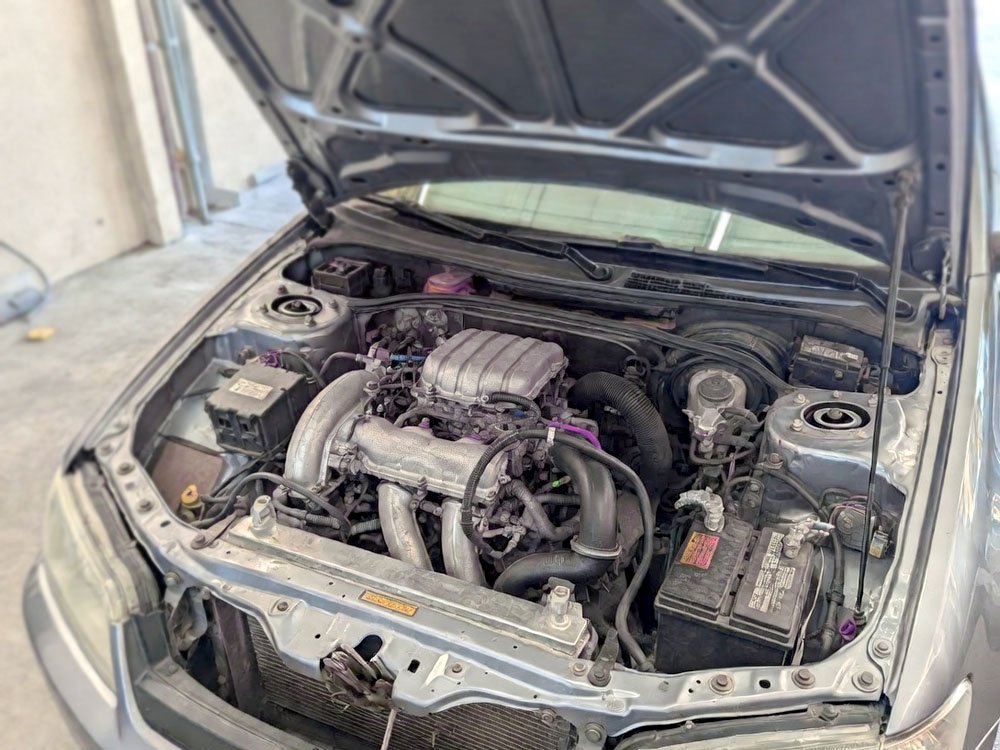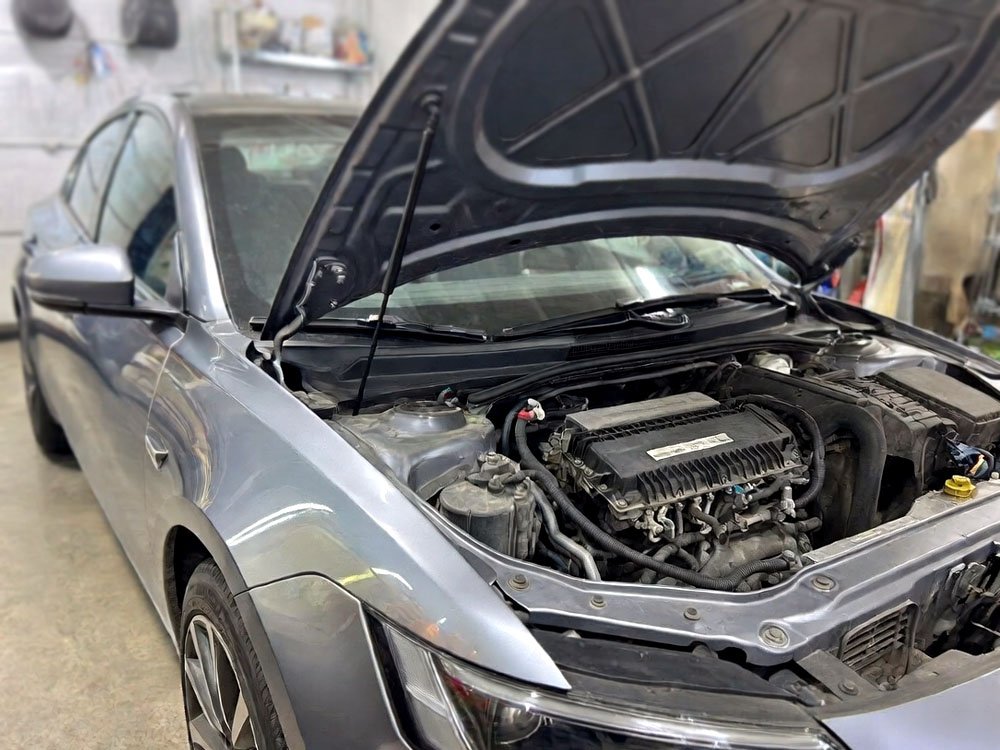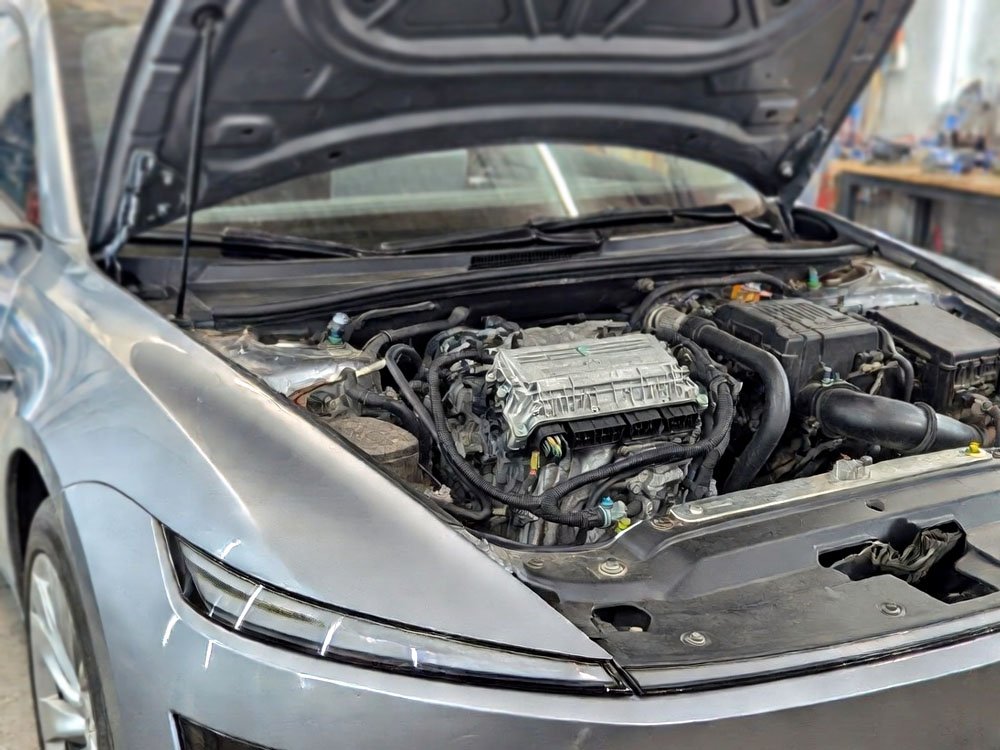You know how frustrating it is when you turn on your car AC, and it takes forever to get cold? Yeah, we’ve all been there. But don’t worry, there are some simple reasons why this happens and easy ways to fix it.
First, let’s talk about why your car AC might be slow to cool. Maybe it’s low on refrigerant, the filters are dirty, or the AC system needs a little maintenance. When your AC isn’t working right, those hot summer drives can feel even longer.
In this article, we’ll explore the common problems that cause slow cooling in car AC systems and give you easy tips to fix them. By the end, you’ll know how to keep your car cool and comfortable, even on the hottest days. Let’s dive in and get that AC blowing cold air again!
Common Causes of Car AC Takes a While to Get Cold
A car AC that takes a while to get cold can be a real pain, especially on a hot day. Here are some common reasons why this happens and what you can do about it.
Low Refrigerant Levels
One of the main reasons your car AC might not be getting cold quickly is because it’s low on refrigerant. Refrigerant is the stuff that makes the air cold. If there’s not enough of it, the AC won’t work as well. You might need to get a professional to check the levels and top it up if needed.
Dirty or Clogged AC Filters
If your AC filters are dirty or clogged, air can’t flow through them properly. This can make your AC take longer to cool down your car. It’s a good idea to check your filters regularly and clean or replace them if they look dirty.
Faulty AC Compressor
The AC compressor is the part that helps circulate the refrigerant through the system. If the compressor isn’t working right, the refrigerant can’t do its job, and your AC won’t get cold fast. You might notice a strange noise coming from the AC when the compressor is faulty.
Blocked Condenser
The condenser helps cool the refrigerant after it has absorbed heat from the car’s interior. If the condenser is blocked or dirty, it can’t do this effectively. Check for debris or dirt around the condenser and clean it if needed.
Issues with the AC Fan
The fan helps blow the cold air into your car. If the fan isn’t working correctly, the AC won’t be able to cool the car down quickly. Listen for unusual noises from the fan or check if the airflow seems weak.
Problems with the AC Controls
Sometimes, the problem isn’t with the AC system itself but with the controls. If the controls are not set correctly or are malfunctioning, they might not allow the AC to work as it should. Make sure the controls are set to the right temperature and settings.
Leaks in the AC System
Leaks can cause the refrigerant to escape, making the AC less effective. If you suspect a leak, you might notice a hissing sound or see oily spots under your car. A professional can help find and fix any leaks in the system.
Cabin Air Filter Issues
The cabin air filter helps clean the air that comes into the car. If this filter is dirty or clogged, it can reduce the efficiency of the AC. Check the cabin air filter and replace it if necessary.
Thermostat Problems
The thermostat regulates the temperature inside your car. If it’s not working properly, the AC might not cool the car as quickly as it should. A faulty thermostat might need to be replaced.
Electrical Issues
Electrical problems can affect the AC system’s performance. This can include issues with the wiring, fuses, or relays. If you suspect an electrical problem, it’s best to have a professional take a look.
Old or Worn-Out AC System
If your car’s AC system is old or has been used a lot, it might not work as well as it used to. Over time, parts can wear out and need to be replaced. Regular maintenance can help keep your AC running smoothly.
There are many reasons why your car AC might take a while to get cold. Regular maintenance and checks can help prevent most of these issues. If you’re not sure what’s causing the problem, it’s always a good idea to consult a professional. They can diagnose and fix the issue, so you can enjoy a cool car even on the hottest days.
How to Fix Car AC That Takes a While to Get Cold

Check Refrigerant Levels
If your car’s AC isn’t getting cold quickly, one of the first things to check is the refrigerant. Refrigerant is a special fluid that helps your AC cool the air. If the refrigerant level is low, your AC won’t be able to cool the air fast. Here’s how to check and fix it.
First, find the AC service port. This is usually a small nozzle under the hood of your car. You can find it by looking for a small cap with an AC symbol on it. Once you find the port, you’ll need a refrigerant gauge. This tool measures how much refrigerant is in your AC system. Attach the gauge to the service port. It will show you the current level of refrigerant.
If the gauge shows that the level is low, you will need to add more refrigerant. You can buy refrigerant from an auto parts store. The can of refrigerant will come with instructions on how to use it. Be careful not to add too much, as too much refrigerant can also cause problems. Follow the instructions on the can carefully.
After adding refrigerant, check if the AC cools down faster. If it still takes a while to get cold, there might be another issue. In this case, it might be a good idea to take your car to a mechanic. They can check the system more thoroughly and make sure everything is working as it should.
Clean or Replace AC Filters
Another common reason why your car’s AC might not get cold quickly is because of dirty or clogged air filters. These filters are important because they help clean the air that comes into your car. If they are blocked, the air flow will be reduced, and the AC won’t work as efficiently. Here’s how you can check and fix the filters.
Start by locating the filters. They are usually found in two places: in the cabin, which is inside your car, or under the hood. Check your car’s manual if you’re not sure where they are. Once you find the filters, take them out and inspect them. If they are covered in dirt or dust, they will need to be cleaned or replaced.
To clean the filters, gently brush off any dirt or debris. If the filters are too dirty, it’s better to replace them. You can buy replacement filters at an auto parts store. Make sure to get the right type for your car model.
After cleaning or replacing the filters, put them back in place. This should help improve the airflow through the AC system, allowing it to cool the car faster. If the AC still takes a long time to get cold, there might be another issue that needs to be looked at by a mechanic.
Check the AC Compressor
The AC compressor is a key part of your car’s air conditioning system. It helps move the refrigerant around so that the air can be cooled. If the compressor isn’t working right, your AC might not cool down quickly. Here’s how to check the compressor.
First, turn on the AC and listen carefully for any strange noises. The compressor should make a smooth, steady sound. If you hear loud or unusual noises, it might be a sign that the compressor is failing.
Next, check the compressor for any visible damage or leaks. Look around the compressor and the hoses connected to it. If you see any signs of damage or leaks, this could be causing the problem.
If you suspect there’s an issue with the compressor, it’s best to get help from a professional. A mechanic can inspect the compressor more thoroughly and determine if it needs to be repaired or replaced. Fixing or replacing the compressor can help your AC work more efficiently and cool down your car faster.
Clean the Condenser
The condenser is another important part of your car’s AC system. It helps cool the refrigerant after it has absorbed heat from inside the car. If the condenser is dirty or blocked, it can affect how well the AC cools the air. Here’s how to clean it.
First, locate the condenser. It’s usually found in front of the radiator. Look for a metal mesh or coil that might be covered in dirt or debris. You can clean the condenser by gently brushing off any debris or using compressed air to blow away the dirt.
Be careful not to damage the condenser while cleaning it. After you’ve cleaned it, check to make sure there are no blockages that could prevent air from flowing through it.
Cleaning the condenser should help improve the performance of your AC. If you still notice that the AC is slow to cool down, there might be another issue that needs professional attention. A mechanic can help diagnose and fix any other problems with your AC system.
Inspect the AC Fan
The AC fan helps blow the cool air into your car’s interior. If the fan isn’t working properly, it can make the AC take longer to cool down your car. Here’s how to check the fan.
Start by turning on the AC and listen to see if the fan is running. You should hear a consistent noise when the fan is working. If the fan is silent or making unusual noises, it might be having problems.
Next, inspect the fan for any visible issues. Look for broken or damaged blades. Also, check the fan motor and wiring to make sure everything is connected properly.
If the fan isn’t working correctly, you might need to replace it or fix any issues with the wiring. This can be a bit tricky, so if you’re not comfortable doing it yourself, it’s a good idea to take your car to a mechanic. They can help ensure the fan is working properly and that your AC cools down faster.
Check the AC Controls
Sometimes the problem with your car’s AC might be with the controls rather than the AC system itself. If the controls are not set correctly or are malfunctioning, the AC might not work as it should. Here’s how to check the controls.
Start by making sure the AC controls are set to the right settings. Check that the temperature is set to cold and the fan speed is set appropriately. Try adjusting the settings to see if it makes a difference.
If the controls seem to be malfunctioning or not responding, there could be an issue with the control panel itself. You might notice that the controls don’t change the temperature or fan speed as they should.
If you suspect a problem with the controls, it’s a good idea to have a mechanic inspect them. They can diagnose any issues with the control panel and make any necessary repairs. Fixing the controls can help your AC work more efficiently and cool down your car faster.
Look for Leaks
Leaks in your car’s AC system can cause refrigerant to escape, which makes the AC less effective. If you think there might be a leak, here’s how to check for it.
Start by inspecting the area around the AC system for any oily spots. Refrigerant can leave oily marks where it leaks. Look under your car and around the AC components for any signs of leaks.
You might also hear a hissing sound if there’s a leak in the system. This sound comes from the refrigerant escaping.
If you suspect a leak, it’s best to get help from a professional. A mechanic can use special tools to find and fix leaks in your AC system. Repairing any leaks will help ensure that your AC works properly and cools down your car more quickly.
Replace Cabin Air Filter
The cabin air filter helps clean the air that comes into your car’s interior. If the filter is dirty or clogged, it can make the AC less effective. Here’s how to replace the cabin air filter.
First, find where the cabin air filter is located. It’s usually found behind the glove compartment or under the dashboard. Check your car’s manual if you’re not sure where it is.
Once you find the filter, remove it carefully. Check if it’s dirty or clogged. If it is, you’ll need to replace it with a new one.
You can buy a replacement cabin air filter from an auto parts store. Make sure to get the right type for your car model. Install the new filter in the same place as the old one.
Replacing the cabin air filter can help improve the airflow in your car and make the AC work more efficiently. If you still have issues with the AC, there might be other problems that need to be checked by a mechanic.
Check the Thermostat
The thermostat helps regulate the temperature inside your car. If it’s not working correctly, the AC might not cool the car as quickly as it should. Here’s how to check the thermostat.
First, monitor the temperature inside your car when you adjust the thermostat. If you notice that the temperature isn’t changing as it should, the thermostat might be faulty.
You can also check if the thermostat is stuck or not responding. If it doesn’t change the temperature or seems to be malfunctioning, it might need to be replaced.
If you think there’s an issue with the thermostat, it’s best to have a mechanic inspect it. They can diagnose the problem and replace the thermostat if necessary. A properly working thermostat will help your AC cool the car more effectively.
Inspect Electrical Components
Electrical issues can affect the performance of your car’s AC system. Problems with wiring, fuses, or relays can make the AC less effective. Here’s how to check for electrical issues.
Start by inspecting the fuses related to the AC system. Look for any blown fuses and replace them if needed. You can find the fuse box in your car’s manual.
Next, check the wiring around the AC system. Look for any damaged or frayed wires that might be causing problems.
If you’re not sure about the electrical components, it’s a good idea to have a professional mechanic take a look. They can diagnose and fix any electrical issues, ensuring that your AC system works properly and cools your car down quickly.
Regular Maintenance
Regular maintenance is key to keeping your car’s AC system in good working condition. Regular checks can help prevent issues and keep your AC running smoothly. Here’s what you should do.
Schedule regular check-ups for your AC system with a mechanic. They can inspect all the components and make sure everything is working as it should. Regular maintenance can help catch problems before they become serious.
Follow the manufacturer’s maintenance recommendations for your car’s AC system. This includes checking and replacing filters, refrigerant, and other parts as needed.
Keeping up with regular maintenance can help ensure that your AC system works efficiently and cools your car quickly. If you ever notice any problems with the AC, addressing them promptly can help keep your car comfortable and enjoyable to drive.
Are these Questions in Your Mind?
Is it normal for the AC to take a while to get cold on a hot day?
Yes, it’s common for the AC to take longer to cool down the car when it’s very hot outside. The AC system needs time to lower the temperature from a high level, especially if the car has been sitting in the sun.
Can a dirty windshield affect the AC’s cooling performance?
Yes, a dirty windshield can affect the AC’s cooling performance. Dust and grime can block the air from flowing properly, making the AC work harder to cool the interior.
Do I need to clean the AC system regularly?
Yes, it’s a good idea to clean the AC system regularly to ensure it works efficiently. This includes cleaning the filters and condenser to remove any dirt or debris that could affect performance.
Is it possible for the AC to freeze up?
Yes, the AC system can freeze up if there is a problem with the refrigerant levels, airflow, or if the system is not maintained properly. Frozen components can prevent the AC from cooling effectively.
Can a malfunctioning thermostat cause slow cooling?
Yes, a malfunctioning thermostat can cause slow cooling. If the thermostat is not regulating the temperature correctly, the AC might not cool the car efficiently.
Do I need to replace the AC compressor if it’s making noise?
Not necessarily. A noisy AC compressor could be a sign of several issues, including low refrigerant or worn-out parts. A mechanic can diagnose the problem to determine if the compressor needs to be replaced.
Is it safe to add refrigerant yourself?
It can be safe to add refrigerant yourself if you follow the instructions carefully. However, if you’re unsure or uncomfortable doing it, it’s best to have a professional handle it to avoid overfilling or damaging the system.
Can a faulty AC relay affect cooling performance?
Yes, a faulty AC relay can affect cooling performance. The relay controls the electrical current to the AC system, and if it’s not working properly, the system may not function as expected.
Do I need to replace the cabin air filter every year?
It’s generally recommended to replace the cabin air filter every 12,000 to 15,000 miles or once a year, but this can vary depending on driving conditions and the manufacturer’s recommendations.
Is it normal for the AC to smell bad when first turned on?
No, it’s not normal for the AC to smell bad. A musty or unpleasant odor could indicate mold or mildew in the system. If you notice this smell, it’s a good idea to have the system inspected and cleaned.


